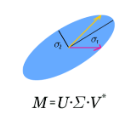Low-rank matrix models have been universally useful for numerous applications starting from classical system identification to more modern matrix completion in signal processing and statistics. The nuclear norm has been employed as a convex surrogate of the low-rankness since it induces a low-rank solution to inverse problems. While the nuclear norm for low-rankness has a nice analogy with the $\ell_1$ norm for sparsity through the singular value decomposition, other matrix norms also induce low-rankness. Particularly as one interprets a matrix as a linear operator between Banach spaces, various tensor product norms generalize the role of the nuclear norm. We provide a tensor-norm-constrained estimator for recovery of approximately low-rank matrices from local measurements corrupted with noise. A tensor-norm regulizer is designed adapting to the local structure. We derive statistical analysis of the estimator over matrix completion and decentralized sketching through applying Maurey's empirical method to tensor products of Banach spaces. The estimator provides a near optimal error bound in a minimax sense and admits a polynomial-time algorithm for these applications.
翻译:从古典系统识别到更现代化的信号处理和统计矩阵完成等许多应用中,低级矩阵模型普遍有用,从古典系统识别到更现代的信号处理和统计的矩阵完成等许多应用。核规范一直被用作低级的螺旋替代器,因为低级标准引发了对反问题的低级解决办法。低级的核规范与单值分解的聚变标准相当相似,但其他矩阵规范也导致低级。特别是当人们将一个矩阵解释为Banach空间之间的线性操作者时,各种高压产品规范将核规范的作用普遍化。我们提供了从噪音腐蚀的地方测量中回收大约低级的低级矩阵的摄调控制估计器。高压北气调节器的设计要适应当地结构。我们通过将Maurey的经验性方法应用于Banach空间的蒸汽产品,从矩阵完成和分散的草图中获取对顶点的统计分析。估计器提供了一种近乎最佳的错误,在微轴感应感中接受这些应用的聚度算法。



